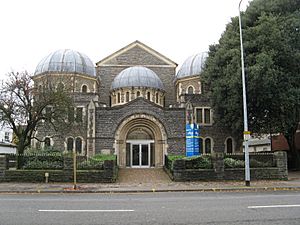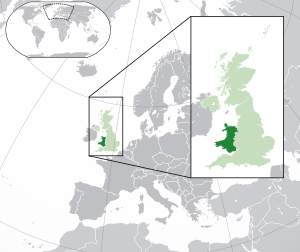History of the Jews in Wales facts for kids
| Iddewon Cymreig יהודים וולשים |
|
|---|---|
| Total population | |
| 2,044 (2021) | |
| Regions with significant populations | |
| Cardiff | |
| Languages | |
| English, Welsh, Hebrew, Yiddish | |
| Religion | |
| Judaism | |
| Related ethnic groups | |
| British Jews, English Jews, Scottish Jews, Irish Jews, Northern Irish Jews, Ashkenazi Jews |
The history of the Jews in Wales tells the story of Jewish people living in Wales. Their story in Wales began a long time ago, in the 1200s. However, after King Edward I of England took control of Wales around 1283, he ordered all Jews to leave England in 1290. This order also affected Jews in Wales. For many years after that, there is almost no record of Jewish people in Wales until the 1600s.
Jewish communities started to be recorded again in the 1700s. But most Jewish families moved to Wales in the 1800s.
Contents
Early Jewish Life in Wales
Like most of Western Europe during the Middle Ages, medieval Wales was mainly Christian.
A writer and clergyman named Gerald of Wales traveled through Wales in 1188. He wrote a book about his journey. In his book, he didn't mention seeing any Jewish people in Wales. However, he did tell a story about a Jewish person and a Christian priest traveling together in England.
During the 1200s, there are records of Jewish people living in places like Abergavenny, Caerleon, and Chepstow. These towns were in areas of South Wales called the Welsh Marches. These areas were ruled by powerful lords, not directly by the English king.
Most Jewish people probably left Wales after King Edward I's order in 1290. Even though the king's order might not have fully applied to all the Marcher Lordships, many still left. A Welsh history book from that time mentions the order but only talks about Jews in England. There is one record of an unnamed Jewish person in Carmarthenshire in the late 1300s.
Jewish Communities Grow
After 1290, there were very few official records of Jewish people in England until they were formally allowed to return in 1655. There isn't much information for Wales during this time either.
The BBC says that Judaism was the oldest non-Christian faith to be established in Wales. Jewish people were present in Swansea around 1730. More Jewish communities then formed in the 1800s in places like Cardiff, Merthyr Tydfil, Pontypridd, and Tredegar.
Modern Jewish Life in Wales

In the 1800s, the coal mining industry in Wales grew very quickly. This led to a lot of new jobs and many people moving to Wales. Jewish people also moved to Wales in large numbers. They started new Jewish communities, especially in the industrial areas of the South Wales Valleys.
For example, in 1852, there were only 13 Jewish families in Cardiff. But after many Jews came to Wales to escape attacks in Russia in the 1880s, Cardiff's Jewish population grew to 5,500 people. A synagogue (a Jewish house of worship) was built in Merthyr Tydfil in 1875. By the end of the 1800s, most towns in the Valleys had small Jewish communities and businesses.
Most of the time, these communities were accepted. However, there were some difficult times. In 1911, there were attacks against Jewish-owned businesses in the Tredegar area. These attacks caused a lot of damage. The 1999 film Solomon & Gaenor shows what Welsh Jewish society was like during the time of these events.
The comedian and writer Bennett Arron, who is Jewish and Welsh, made a documentary called The Kosher Comedian that talked about some of these topics.
Jewish communities in Wales continued to grow. More Jewish people arrived as refugees from Europe in the late 1930s, escaping the Nazi regime.
Today, the main Jewish communities in South Wales are centered around the Cardiff Reform Synagogue and the Cardiff United Synagogue. There is also a synagogue in Swansea. The Merthyr Synagogue, which was once a major synagogue north of Cardiff, stopped holding regular services in the 1970s and was later sold. It is a listed building, which means it's historically important. There are plans to turn it into apartments, but some people want it to be moved to the St Fagans National Museum of History near Cardiff.
The number of people in the Welsh Jewish community stayed about the same between the 2011 and 2021 censuses.
Notable Welsh Jewish People
Many famous people have Welsh-Jewish backgrounds, including:
- Dannie Abse
- Leo Abse
- Bennett Arron
- David Baddiel
- Sacha Baron Cohen (whose father has Welsh-Jewish roots)
- Michael Howard
- Brian Josephson
- Denise Levertov
- Michael Moritz
- Lucy Owen
- Jon Ronson
- Bernice Rubens
 | Roy Wilkins |
 | John Lewis |
 | Linda Carol Brown |


